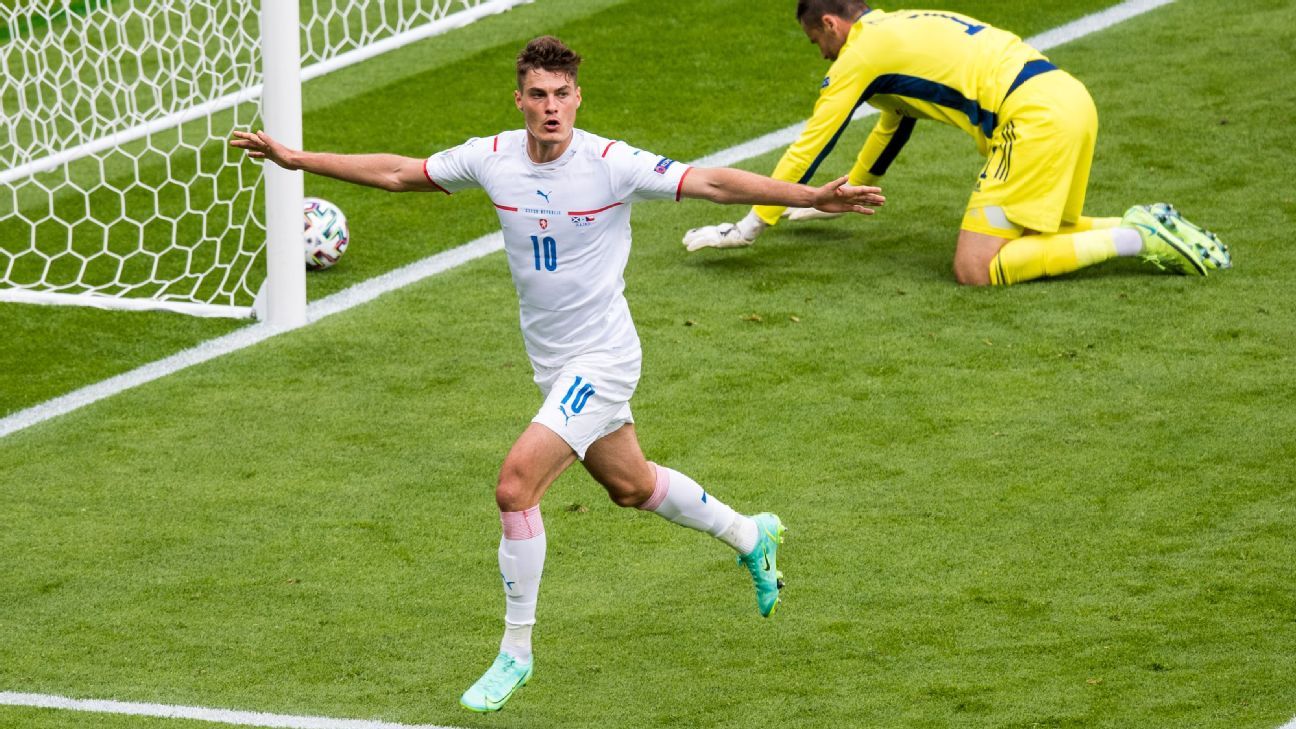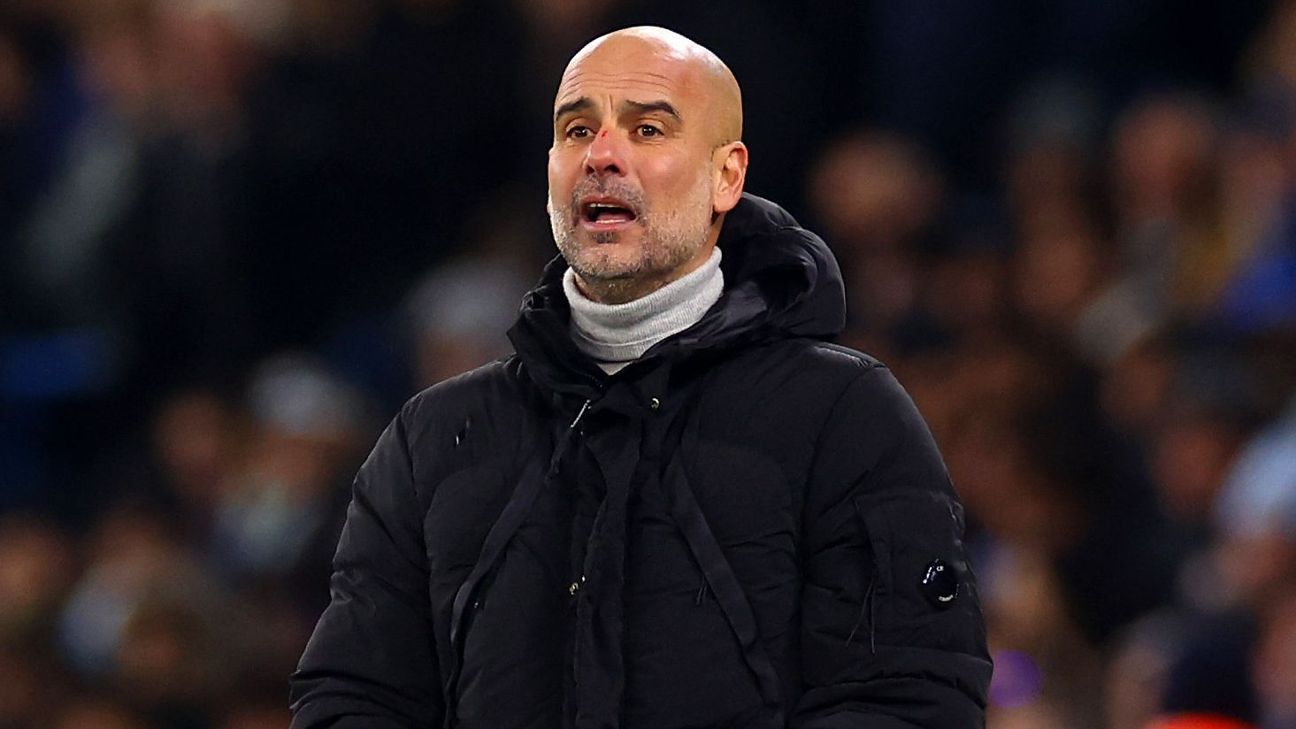
GLASGOW, Scotland -- For at least the next 24 hours, every child in a playground in Scotland will pretend they're Patrik Schick. Monday's Group D clash at Euro 2020 was meant to be a chance for Scotland to dazzle after a 23-year absence from major tournaments. But it'll be remembered for Schick's ridiculously audacious, perfectly weighted goal from the halfway line in a 2-0 win for the Czech Republic.
- Report: Scotland stunned by Schick, Czech Republic
Schick's wonder goal was from 54 yards, making it the longest goal at a Euros or World Cup since 1980, and edging out David Villa's strike from 46.5 yards for Spain against Chile in the 2010 World Cup. (It's still a little short of USA's Carli Lloyd, who scored from 56 yards in the 2015 Women's World Cup final, but Schick now holds the men's record since such records were kept.)
Schick had already left his mark before he scored one of the all-time great goals in the 52nd minute. With the Czech Republic leading 1-0 thanks to his first-half glancing header and Scotland battling furiously to get back into a match they'd been dominating, a blocked shot in the Czech defensive third spun kindly towards the halfway line. With a two-on-two, Schick saw Scotland goalkeeper David Marshall 30 yards off his line and as he touched the halfway line, he put his left foot through the ball.
"I checked already in the first half, for maybe when this situation will come: I knew he stayed very high [off his line], so when the ball came, I just did a quick check, where is he standing, I saw him off his line, so I tried," Schick said after the 2-0 win.
As the ball looped towards Scotland's goal, silence fell over the 12,000-plus crowd in Hampden Park. A sole cry of 'f--- no!' was heard as it arrowed towards the goal. Marshall back-pedalled, but was unable get a hand on it, ending up a crumpled heap (and social media meme) in the net.
"It was a nice goal," Schick said in a wonderfully understated way.
You could see his genius," quipped Czech manager Jaroslav Silhavy. "I'm happy he scored like that. We know he's a genius, he knows how to finish and that's why he's there. The first goal was a cross and header from him, the second goal was something out of this world.
"We really haven't see a goal like that from the middle of the field for a long time."
- Euro 2020 on ESPN: Stream LIVE games and replays (U.S. only)
- European Soccer Pick 'Em: Compete to win $10,000
- Euro 2020 bracket and fixture schedule
Schick, only 25 years old, has been one to watch in European football for a while and at the Bundesliga's Bayer Leverkusen, he's living up to his long-mooted potential. The confidence he found to take that incredible goal, first time, was born from the emotional boost of completing a full season without injury.
Minor issues have stunted his progress over the past five years, reducing his impact after he exploded onto the world football scene with Sampdoria in 2016. His performances in that first Serie A year led to Juventus deciding to activate his €30m release clause, only to then back out of the deal due to concerns over his medical. He instead went to Roma, but had a miserable couple of seasons -- scoring just five times in 46 Serie A matches -- until RB Leipzig picked him up on loan in 2019. There, he found his rhythm under Julian Nagelsmann and Leipzig wanted to keep him, only for Bayer Leverkusen to sweep in last summer.
He's impressed this term, scoring nine in 29, but all the while proving himself to be a handful and inevitably drawing two defenders in an attempt to nullify his influence. Yet nobody, especially not Scotland, could have predicted that moment of magic, a timely reminder that in an era of defending and pressing higher up the pitch, you can still be undone by a more direct approach.
"If [Marshall] was on his line he'd have caught it, but rather than looking to apportion blame all the time, give [Schick] credit," Scotland manager Steve Clarke said.
Scotland, for their part, were bright and aggressive, the 2-0 defeat an unfair representation of the balance of play. Bar Schick, Andrew Robertson was the best player on the field; Jack Hendry hit the bar, Lyndon Dykes twice went close, Ryan Forrest had a strong effort deflected over and Czech goalkeeper Tomas Vaclik did wonderfully to claw an awkward, looping back pass from ending up in the Czech net. While the Scots lacked cohesion and accuracy in the first half, you felt it was because they were trying to do everything at 200 miles per hour, whipped up by the weight of 23 years of annual failure, and the pressure of a hungry nation finally back on the big stage.
- Euro 2020 on ESPN: Latest news, features, video
- Which team has the best kit at the Euros?
- Euro 2020: The ultimate preview
Glasgow was a sea of blue and white in the build-up. The 1970s anthem "Yes Sir, I can Boogie" was being whistled, hummed or roared around the city; T-shirts were on sale with that phrase emblazoned while flags were sold with "No Scotland, No Party." With 3,000 people packed into the Fan Zone on Glasgow Green and 12,000 inside Hampden, the nation was united behind Clarke's team. But this match was decided by the 52nd minute, thanks to Schick's wonder goal.
He was by far the player Scotland found hardest to handle. The first goal he scored was more industrial, as he muscled between Liam Cooper and Grant Hanley to meet a looping cross and glance a header past Marshall in the 42nd minute. His next chance at the start of the second half was well-saved by Marshall, though his next effort would be that unicorn of a goal. The Euros have enjoyed a tapestry of wondrous agenda-setting strikes -- Marco van Basten's volley on the turn from a ridiculous angle in 1988, Antonin Panenka's penalty in 1976, Ronnie Whelan's thunderbolt in 1988, Xherdan Shaqiri's overhead kick in 2016 and, of course, Paul Gascoigne's against Scotland in 1996. But Schick's is up there with the best.
Scotland are now rooted to the foot of Group D after the first round of games with England up next on Friday at Wembley. "[It was] a marvellous finish and from there it becomes a long and difficult afternoon," Clarke said afterwards. "Sometimes a football match doesn't go your way." The tournament is in its infant stages and Scotland can still leave a legacy for the next generation, but for the 12,000 fans in the ground they will tell their grandchildren in years to come they were at Hampden Park on June 14. But not because of being there when Scotland returned to a major tournament for the first time in 23 years, but because of Schick's incredible strike.















 Phone: (800) 737. 6040
Phone: (800) 737. 6040 Fax: (800) 825 5558
Fax: (800) 825 5558 Website:
Website:  Email:
Email: 






